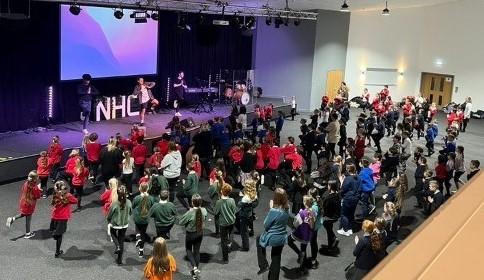From IT services to education: Ian Paxton's professional skillset serves him well as a volunteer multi-academy trustee
A school may be a space for children to learn about the world, but it's also a physical building — with all the logistical challenges it entails. As a trustee for the Embark Federation, a multi-academy trust encompassing 19 schools, Ian Paxton, Service Architect at Leidos UK helps take care of these underpinnings so that the 600 staff members and 6,000 pupils across the schools can focus on the most important thing — education.
"The last thing teachers want to be dealing with are issues about concrete or the heating and the lighting. "They need to be able to assume all of that works so they can focus on how the children are being taught, making sure that they can perform well and enjoy themselves in the classroom."
The role was quite a step up for Ian, who began by volunteering as a parent governor at the 120-pupil school that one of his children attended. However, his experience in managing the provision of critical IT
services to large corporations and government departments equipped him well for the challenge.
"It's a bit of a leap forward," he says. "I've gone from thinking about 'can we afford to redecorate this particular classroom to now considering the bigger picture of how you manage a multi million pound budget and what kind of systems need to be in place across all our schools."
Ian's current challenge is helping to manage the ongoing centralisation of the multi-academy trust's IT systems. But the role also draws upon the broader skillset he's acquired over his past 13 years working in service delivery.
Ian uses the recent news about the risks associated with reinforced autoclaved aerated concrete (RAAC) in schools, as reported by the BBC, to highlight the importance of risk management.
"An important part of the role is looking into the various risks our schools face and how to manage them," he explains. "If you take the defective RAAC concrete, for example, we've been making sure that all of our schools have a risk assessment and then sharing that information with the parents and local authority. That all needs to be done quickly and effectively to put teachers' and parents' minds at ease that you are in control and managing the situation."
Like Ian, many of his fellow trustees contribute specialist skills and unique connections from their professional lives. As a result, they've arranged activities for their students, such as trips to the West End, which the individual schools would struggle to pull off alone. It is testimony to their work that the trust is currently up for a national award.

Leidos doesn't just support volunteering; they actively advocate for it. I think that's so important because, regardless of whether you're planting trees and picking up litter or trying to improve children's experiences in school, it is so rewarding and fulfilling when you can use your valuable skills and abilities to give back to society.
Ian Paxton
Service Architect, Leidos UK
Embark Federation's needs can be variable, with Ian's role typically involving around six to ten hours of his time every month. Balancing that demand is possible — not only because the trust understands that his work takes priority, but also because Leidos appreciates that work can be flexible. That means Ian could bank extra hours during the month to allow a half day off for an in-person school visit or just take an hour out for a board virtual meeting and work it back later. As long as his team isn't working towards an important bid deadline, there's an understanding that he can manage his work around his personal commitments.
Flexibility is a core element of Leidos’ employee value proposition – the company has been empowering people to work flexibly for years.




